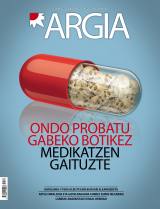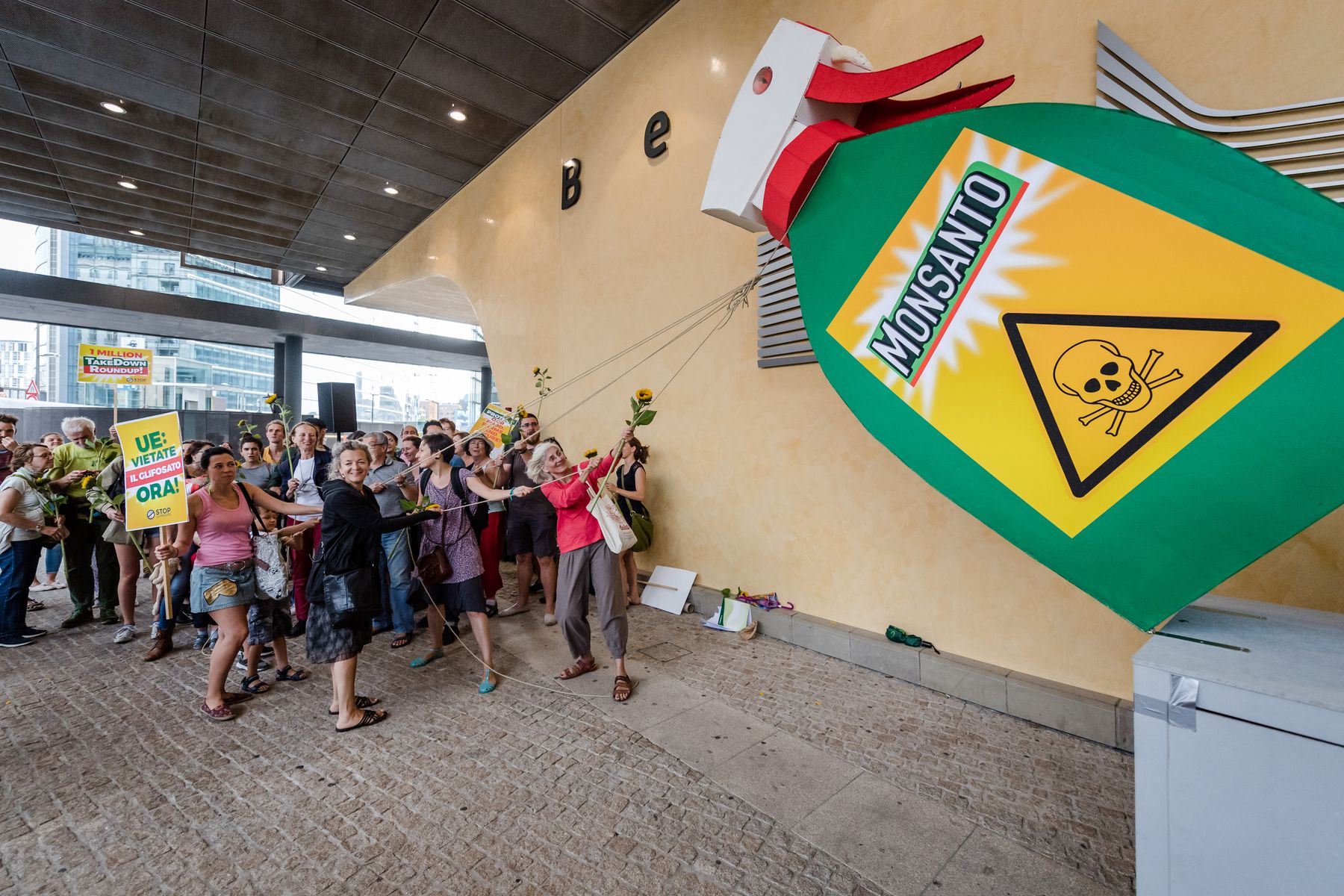Manual de Monsanto: Defusing the work of scientists to continue selling poison
- The Member States of the European Union shall vote on 25 October on the extension or suspension of the marketing authorisation for herbicide glyphosate. The authorisation currently in force will expire on 31 December of this year and the European Commission has proposed a renewal for another ten years, despite the fact that in 2015 the IARC, a WHO-dependent agency studying cancer, has declared glyphosate likely to be carcinogenic.

Contrary to the opinion of the IARC, a number of European agencies, including EFSA, which ensures food safety, have stated that there is no reason why glyphosate, the world’s best-selling herbicide, should be harmful. In recent months, however, EFSA itself and ECHA, which is responsible for the safety of chemicals in Europe, have been accused of failing to take into account various studies when carrying out their resolution.
Monsanto had known it for a long time
The last episode of these complaints took place on 4 October. On that day, several people, all of them affected by cancer, who have opened a case against Monsanto in the United States, visited Brussels, with their lawyers, to ask the European authorities to take account of the recently disseminated evidence on the risk of glyphosate.
In declassified Monsanto documents it can be seen that the company had long known the toxicity of glyphosate
An US court has ordered the declassification of numerous internal documents of the multinational, following the proceedings against Monsanto, which have been called Monsanto's papers. They showed that the company had long known the toxicity of one of its main products. As a result of a study requested by the company in 1999, the toxicologist James Parry warned Monsanto that glyphosate has the capacity to cause cell mutations, and that the impact that its commercial formulation, which the company sells under the brand Roundup, may have should be studied.
Parry's research was never published and his recommendations were not taken into account. But the transnational knew that glyphosate could be dangerous, as demonstrated by a document that is among the roles of Monsanto. Donna Farmer, a toxicologist of the company, wrote in 2002: “We can’t say that Roundup doesn’t cause cancer. We haven’t done a study of its carcinogenicity.”
Questioning the reputation of scientists
Monsanto silently covered the results of his research, but caused a big stir when the IARC announced in 2015 that glyphosate is probably a cancer agent in humans. According to several officials of the agency, the resolution on glyphosate opened the door to an aggression that had never been seen against it.
In April 2016, an article published by the Reuters agency questioned the criteria used by the IARC to classify carcinogenic substances and particularly criticized the inclusion of glyphosate in this list.
The content of the article was widely disseminated in the media around the world. It soon became known – but not so much divulged – that her author, Kate Kelland, was based on the material chosen and donated by Monsanto. On the other hand, Kelland is the payment advisor to Bob Tarone Monsanto, presented as an “independent scientist.” As Carey Gilliam, a former Reuters journalist, explained, Kelland helped create the Science Media Centre to bring scientists and journalists like Tarone and Kelland in touch, and gets a large share of its funding from agrochemical companies, including Monsanto. A quick visit to the newspaper library is enough to realize that Kelland has signed numerous articles in Reuters, strongly criticizing what the IARC has decided on glyphosate.
"Junk science"
The Reuters article is but a unique example of a great campaign, according to a research paper published in Le Monde by journalists Stéphane Horel and Stéphane Foucart. First, Monsanto said that the IARC decision was the result of bad science. Specifically, they used the English term junk science.
The consideration of research contrary to their interests as bad sciences is the first step observed in the handbook of large companies, a tactic that allowed the tobacco industry, for decades, to hide or, at least, generate doubts about the relationship between the products it sells and cancer, and that has been a method systematically used since then. Monsanto is one of the clearest examples.
The IARC undergoes an unprecedented attack in 2015 after glyphosate was likely to cause cancer
While the Missouri multinational was broadcasting this message in the media, their lawyers sent letters to scientists about glyphosate for the IARC asking for their documents to be sent. The Americans, moreover, were brought to court. At the same time, seed lobbies and pesticides referred their complaints to the bodies that finance the organization by decision of the IARC.
A small army diffuses the truth of Monsanto
Monsanto's own executives have explained that they have a line of work called Let nothing go, which basically consists of responding to each and every criticism received by the company. Monsanto, through other companies, hires people apparently outside the industry to defend their products and activities in the media and social networks and attack their opponents.
They're not alone in this work. Behind a soup of acronyms are numerous groups defending the interests of the pesticide, seed and chemical synthetic industry, which constantly criticise the findings of the IARC and other organizations it collaborates with, questioning the results of its research.
The independence of the EFSA, in doubt
Among the roles of Monsanto are some messages that show close links between the company and the United States Environment Agency (EPA). The lawyers of the opponents of Monsanto who moved to Brussels on 4 October suggested that the same thing could happen in Europe. Although there is currently no concrete evidence, an article published in September by The Guardian showed that some passages of the EFSA report that surely claims glyphosate are literally identical to those written by Monsanto.
Moreover, the independence of EFSA has been called into question on more than one occasion. The non-governmental organisation CEO, which observes the activity of Lobby, has published a report in June which states that about half of the scientists working for the EFSA have a relationship with the food industry.
Glifosatoa baliatzeko hamar urteko luzapena babestu du Europako Batzordeak. Herbizida gisa munduan gehien erabiltzen den produktu kimikoa da, eta potentzialki minbizi sortzaile izateagatik ezaguna da.
Europako Batzordeak 2022. urtearen amaierara arte eta baldintzarik gabe luzatuko du glifosatoaren baimena, EBko Landare, Animalia, Elikagai eta Pentsuen Batzordean (SCoPAFF) estatu kideek horren alde bozkatu eta gero. Eurolegebiltzarrak eskatua zuen bost urte barrurako erabat... [+]
2016ko hasieratik bosgarren aldiz, Europako Batzordeak ez du lortu EBko estatu kideen gehiengoa glifosato herbizidari baimena luzatzearen alde agertzea. Indarrean dagoen baimena aurtengo abenduaren 31n iraungiko da, eta beste hamar urterako berritu nahi du Batzordeak,... [+]
Urriaren 25ean glifosato herbizidaren merkaturatze-baimena luzatu edo eteteaz bozkatuko dute Europar Batasuneko estatu kideek. Aurtengo abenduaren 31n iraungiko da gaur egun indarrean dagoen baimena, eta Europako Batzordeak beste hamar urterako berritzea proposatu du, 2015ean... [+]
Europako Parlamentuko 30 legebiltzarkidek glifosato pestizida salerosteko baimena ez luzatzeko eskatu diote Jean-Claude Juncker Europako Batzordeko presidenteari.
Europar Batasunean gehien erabiltzen den pestizida da glifosatoa. Europako Batzordea hura merkaturatzeko baimena luzatzen duen edo ez erabakitzen ari den bitartean, herritar talde batek abian jarri du substantzia debekatzea helburu duen herri ekimen legegile (HEL) bat. Haien... [+]
Bigarrenez, bertan behera utzi dute glifosatoaren baimena luzatzeari buruzko bozketa Europako Landare, Animalia, Elikagai eta Pentsuen Batzorde Iraunkorrean. Europako Batzordeak pestizida ezagun hori, munduan zabalduena, beste bederatzi urtez baimentzeko proposamena eraman du... [+]
Kontsentsu zientifiko (eta politiko) ezak eta talde ekologisten presioak eraginda, Europar Batasunak maiatzerako utzi du glifosato herbizidaren baimena luzatzeari buruzko erabakia. Osasunaren Munduko Erakundeak "segur aski kantzerigenoen" zerrendan sailkatu zuen... [+]




















